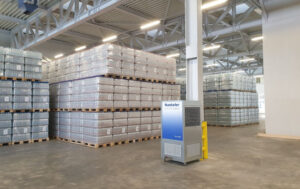

The Purposes and Advantages of Industrial Dust Collectors
There are many hazards associated with industrial environments. Examples include falling hazards, large moving parts and potentially toxic chemicals. However, others can be more difficult to spot. This is often the case when referring to airborne particulate matter. Why are dust collectors often required?
The World Health Organization found that 4.2 million premature deaths were caused by particulate matter in 2016 alone. This is only one example of the dangers that dust may pose.
How do these machines function? What purposes can they serve? How can customers choose the right unit for their needs? These are some of the questions that will be addressed immediately below.
How Does a Dust Collector Function?
The principles behind an industrial dust collector are rather straightforward. The main purpose is to remove particulate matter from the air. Fresh air can then be recirculated so that no hazards are present.
First, the collector uses a series of one or more fans. These fans capture the air through suction. This air is then passed through the filtration system. The dust and particulate matter will adhere to the filter; allowing clean air to be redistributed.
Note that dust collectors are available in a number of configurations. For instance, some portable units are mounted upon castor wheels for easy transportation. Others can instead be permanently mounted to production machinery. The size and power of collectors will also vary. This primarily depends upon the volume of air that needs to be purified.
What Other Roles Can a Dust Collector Fulfil?
We have already seen that these collectors remove particulate matter from the air. So, one of the most common purposes involves providing a safe environment for employees. There are nonetheless some other reasons why these machines may be required.
One example involves production facilities that must be kept sterile at all times or are in need of clean paper or cardboard for the printing process. This is commonly the case when referring to industries such as:
- Silicon chip production
- Pharmaceuticals
- The aerospace industry
- Medical device manufacturing
- High quality printing and packaging companies
Even small levels of airborne particles can quickly cause production to grind to a halt. Therefore, robust systems need to be in place at all times.
Other uses are more practical. For instance, some dust collectors can be used in conjunction with digital printers. These machines will prevent dust from adhering to newly printed material. This is obviously important in terms of quality control.
A Look at the Health Benefits of Dust Collectors
We have already examined some reasons why these collectors are used within production environments. What about the health advantages that they can provide? Let us look at a handful of common scenarios.
Dust collectors will often be used within the construction sector. Cutting bricks, wood and plasterboard can cause particles to be released into the air. Some of these particles may damage the lungs when inhaled. This could even lead to serious medical conditions such as COPD or emphysema.
These collectors may also be applied within commercial locations. Hospitals and schools can install dust collectors to ensure that the air is safe to breathe. Once again, the type of filtration system will be based on the exact application.
How to Choose the Appropriate Dust Collector
We have already seen that there are many applications to choose from. How can the most informed decision be made? The first variable involves whether a portable unit is required or if it will be fixed in place. Another concern is associated with the volume of air that can be filtered. This is normally measured in cubic metres per hour.
The filtration system is an additional factor. HEPA filters and activated carbon systems are two of the most common. In fact, some HEPA filters can remove up to 99.95 per cent of airborne particles.
A final concern is associated with the application of the collector. For example, more robust filtration systems will be needed to remove smaller particles (such as viruses). Other units are specifically designed to be used within the manufacturing and production sectors.
Cutting-Edge Solutions for Modern Times
Not only are dust collectors extremely efficient systems, but they may be required by law in certain cases. The good news is that the team at Hunkeler Systeme is always here to help.
Do you have additional questions? Would you like to learn more about our line of products? If so, do not hesitate to speak with a representative. We will be happy to explain your options as well as to address any relevant concerns.
